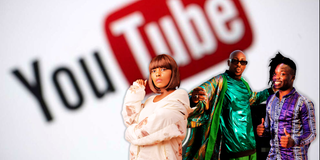
Kenyan artists such as Maandy, Bien, Matata and Flaqo Raz are losing millions in revenue due to malicious or false copyright claims on YouTube.
A YouTube Content Manager who didn’t want his name mentioned said that Copyright claims and strikes are not the same.
“A copyright claim typically arises when someone rightfully or wrongfully identifies content in your video that they believe they own. Claims usually don’t lead to penalties such as account takedowns or suspension. Copyright strike is more severe, this happens when the claimant requests for the removal of your content.” States the YouTube Content Manager.
In 2019, Tanzanian singer Rajab Abdul Kahali, aka Harmonize, accused Kenyan music producer Magix Enga of constantly filling complaints to YouTube which resulted in copyright strikes on his songs, as soon as they got more than a million views.

Tanzanian artiste Rajab Abdul Kahali better known by the stage name Harmonize performing during the Koroga Festival on July 22, 2018 at Two Rivers Mall Nairobi.
It all started in November 2019, when Magix reported Harmonize's hit song ‘Uno’ after the producer claimed the singer sampled beats of his 2018 ‘Dundaing’ hit song performed by rappers King Kaka and Kristoff, without his consent.
Magix later dropped his claims, and the song was restored to YouTube. Harmonize claimed he lost millions of shillings, as the song was already in the top trending songs in Tanzania and Kenya at the time of the strike and had already begun generating considerable royalties.
In 2020, popular online comedian Erastus 'Flaqo Raz' Ayieko had his YouTube channel under his stage name terminated over a copyright strike.
“We’d like to inform you that your channel Flaqo Raz has been terminated because we concluded that it was linked to a channel that was disabled for having three or more Copyright strikes.” YouTube notified Flaqo.
The comedian stated that the constant strikes were a result of several people opening up YouTube channels then downloading his original content and uploading to theirs and then maliciously using those said accounts to file for Copyright claims against his channel.
Last week, rapper Maandy and music collective Matata were the subject of similar copyright strikes that saw their respective records 'Aloo' and 'Mpishi' featuring Bien taken down from YouTube.
‘Aloo’ was taken down after an up-and-coming artist by the name TY Flexx, filed a copyright claim, which Maandy termed as malicious.

Kenyan Rapper Maandy Kabaya.
"This person downloaded a reel I posted and uploaded the audio to their account which they used to delete (pull down) my video." She claimed.
As for Matata, a beat maker filed the Copyright claim against the audio song just after it had garnered over a million views on YouTube and was one of the trending music on TikTok. The beat-maker claims to be the original composer of the beat and is accusing Matata of using it without his consent.
The beat-maker claims to have met members of Matata who are based in Europe while on their visit to Nairobi, before coming up with the beat after which he sent it to the collective via an email. Matata confirmed to have received the email but argued that they didn’t open the email.
In an official statement to the public issued last week, Matata termed the strike as false, malicious and sabotage.
“Just as we were preparing to drop the music video our song was taken down. Not because we broke the rules but because someone chose to take advantage of the loopholes and easy system on YouTube. They submitted a claim without any legitimate reason. The hardest part, it came from a fellow Kenyan (who is) trying to blackmail (us), extort and reap from where they didn’t plant looking for a quick payday.” Part of the statement read.

Kenyan artiste Bien performs during the draw for the delayed 2024 African Nations Championship at the Kenyatta International Convention Centre (KICC) on January 15, 2025.
Matata claims the strike has caused them some significant losses as they had to fly Bien to London for the music video shoot.
Just like Matata, rapper Maandy is also laying the blame on YouTube policies arguing that loopholes in its Copyright policies have made it easy for malicious people to file complaints.
“YouTube Kenya needs to figure out a way to protect artists against false claims such as these. The current policy only works in countries that respect art. Someone can’t wake up and choose to file a baseless claim when I did nothing wrong. My team and I put a lot of work on all our projects which cost millions of shillings and it’s unfortunate that no policies exist to protect Kenyan artistes from such malice” Maandy argues.
Artistes blunders
However, according to the YouTube Content Manager, Kenyan artistes many at times shoot themselves in the foot.
“In Kenya, many creators don’t understand Copyright protections. What’s is more concerning most of them lack Copyright certificates for their works and this leaves them vulnerable to malicious or erroneous claims. Without proof of ownership such as a Copyright Certificate, defending claims becomes significantly harder. From my experience, Kenyan creators are very talented but lack in-depth knowledge of Copyright law and this is the gap being exploited by opportunists who abuse YouTube Copyright systems to take down videos or redirect revenue. Worse still malicious actors can file multiple strikes against a channel and have it deleted sometimes without the creator knowing what went wrong” He says.
Intellectual property lawyer David Katee points also points out to lack of documented agreements among artiste as another reason for claims and strikes.
“You may find an artiste didn’t credit the beat maker, or they didn’t sign a split sheet or didn’t agree on percentages but an artiste went ahead to release the song.” He says
Muriuki Kiai Head of Operations at Mdundo Music, a free music streaming and download platform agrees.
“A lack of proper documentation (think split sheets, copyright registrations, and clear licensing agreements) makes it easier for content to receive a Copyright claim or strike which can cost you views, royalties, and even your reputation.” Says Ms Kiai.
But it’s not only people who can file malicious claims, music companies too are known to do so, says the Content Manager.
“I have also encountered cases where music companies have filed claims against artistes. In one instance a Kenyan artiste was hit with a Copyright claim despite having no prior dealings with an entity. Even after disputing, the company insisted it had an agreement with the artiste claims which were completely false. Today the artiste has lost all revenue from a substantial number of his songs and it’s because he lacked proper documentation to defend his work.”
According to the Content Manager, the YouTube Copyright mechanism is heavily pegged on the burden of proof a loophole that leaves artistes in the cold.
“YouTube’s current Copyright system places owners on the accused, this means that anyone can file a claim and it’s up to the creator to prove their innocence. This system can easily be abused. With this system, YouTube doesn’t verify the claims but moves to penalize creators.” The YouTube Content Manager says.
Lawyer Katee argues that the YouTube Copyright mechanism is deliberately built as such to have the platform bypass any possibility of being involved in Copyright legal battles.
"It’s a loophole that encourages malice but on the other hand, it is to ensure YouTube doesn’t get entangled in legal suits. Its copyright tools are set up in such a way the platform will not have itself tugged into those legal wrangling with its users. The platform has millions of users; you can imagine the number of copyright claims it receives and if it were to be a party to all that.” He says.
In enforcing the Copyright claim, YouTube states that it takes action if a copyright owner submits a valid claimant under the Digital Millennium Copyright Act. If a user gets three copyright strikes in 90 days, their account, along with any associated channels is terminated.
However, YouTube says the affected account can regained after three months although there is no strong appeal mechanism to guarantee reinstatement of the account.
“Here lies the issue, the burden of proof often falls on the accused. This means that even if the claimant strike is baseless the creator must gather evidence to fight the allegation which can be an uphill battle ” Say the YouTube Content Manager.
Although YouTube advises users not to post the works of others, there are still many unauthorized clips from television shows, films and music videos on the platform.
As pointed out, YouTube never has a mechanism to verify the authenticity of content and only acts when a claim is made.
The problem is further compounded by the ability to download the video from YouTube for free using an array of free software provided by developers online. This provides potential malice or copyright claims for users to create illegal copies for commercial purposes.









